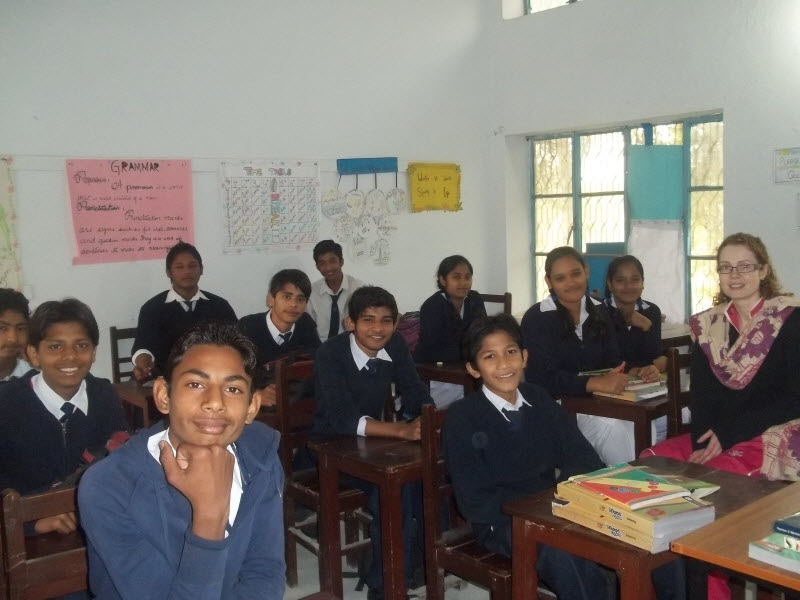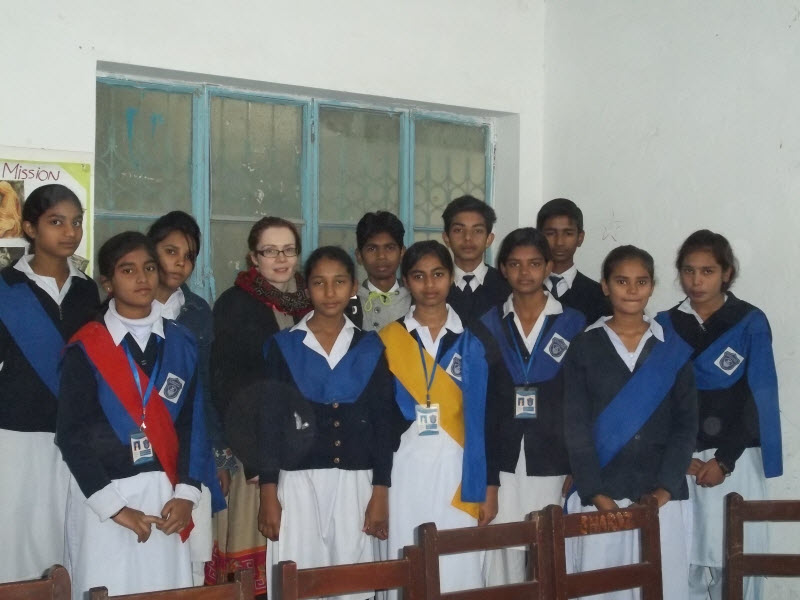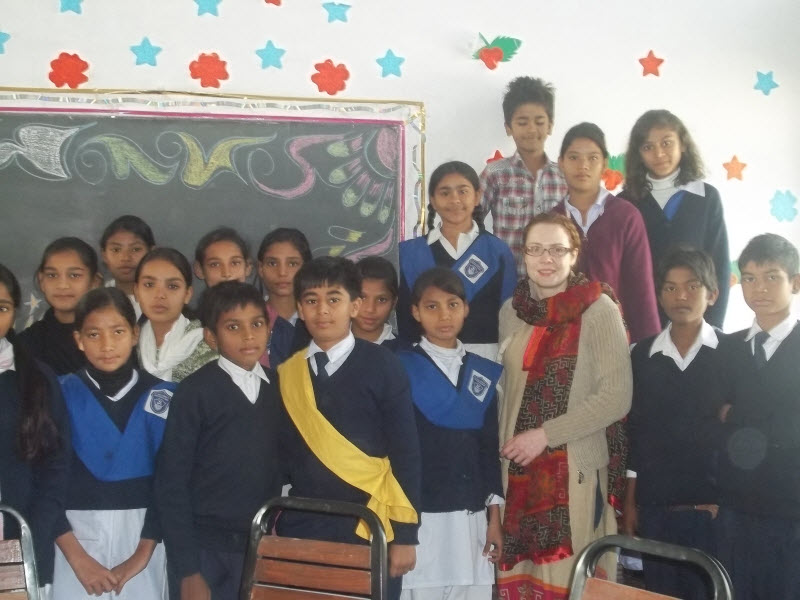Learning Some of What I Don’t Know
By Siobhan McCaffrey

With some of the teachers from St Paul's High School in Greentown
Some Challenges and Possibilities in Collaborating with Teachers in Schools in Lahore, Pakistan, from the brief experience of a Northern Irish Primary School Teacher. The author wrote this article during her second visit to Pakistan. Her first visit, nearly a year earlier, was to visit the grave of her Columban uncle, Fr Pat McCaffrey. We published her account of that visit, Following in Father Pat’s footsteps in November-December 2012.

Sacred Heart Cathedral, Lahore
My uncle, Fr Pat McCaffrey, a Columban missionary, died suddenly in Pakistan in May 2010. Along with my brother Niall, I came to Pakistan the following Christmas to visit his grave. I decided to return again in November 2011, so this is my second visit. This time, even though I speak no Urdu, I wanted to be more included in daily life so looked for the opportunity to work with teachers and children in local schools in a Columban parish in Lahore. I have been working in the schools for just over three weeks and the following attempts to describe and evaluate this experience.
I approached the principal of one of the parish schools and asked her how I might contribute. She asked me to explain the basics of English grammar to the teachers, and also work with some of the older classes in the school. So, I spent the first week preparing a one-day seminar on the topic for 30 teachers.
I had not prepared resources or equipment so initially presumed I would have to do everything with blackboard and chalk. However I discovered the school had a data projector and I was able to use the internet connection in the Columban house to download resources. The topic of the seminar was basic grammar, handwriting and phonics. In Ireland I only teach up to eight-year-olds so felt a little out of my depth preparing to work with older students, much less with teachers.
I soon realised that my own understanding of English grammar is inadequate, in that I am unfamiliar with many technical details. For example, I was unaware that there are a number of kinds of past tense eg, past perfect, past perfect progressive, past perfect continuous, and presumed the tenses were simply, past, present and future. The teachers began asking me questions about the various kinds of past tense and I was at sea. I knew what was correct because of how it sounded but could not explain why something was correct or incorrect. One combination of verbs that puzzled my Pakistani friends and stumped me when asked for an explanation was the association of ‘have’ and ‘had’ in a phrase such as: ‘I have had a good time’. The teachers said to me: ‘“have”’ is present tense and “had” is past tense, so how can they stand together?’ I did not know how to answer using the technical language they needed.

Siobhan with students
Some teachers seemed to have a very good technical understanding of English even though they may not be fluent speakers. That challenged me and I soon realized that to do more work in this line I would need to update my knowledge of English grammar. A weakness in the English language learning system in Pakistan that seems to have been in place here for many years is the tendency to emphasise an appreciation and understanding of the technicalities of the language to the detriment of fostering the ability to speak it. Colloquialisms and regional developments are hardly taken into account.
Overall the seminar went well but I had little feedback from participants during the first part so I wondered whether or not I was communicating with them but things warmed up later in the day. Subsequently, during some afternoon sessions, I worked through the content of the seminar with a smaller group of secondary school teachers and it went very well as many of them have quite good English and were keen to further improve it.
I also received a request to teach story writing but did not get around to it due to other requests from the teachers. However I did wonder how I might tackle such a task, given the limited vocabulary of the teachers and also their inadequate understanding of how to say things in fluent English.

Siobhan with students
I visited other schools in the parish but felt that our communication was poor. I feel that, in order to communicate via English, participants need a certain level of proficiency that in fact some did not have, especially in the schools where English is not the medium of instruction. Even where English is the medium school texts are often in both English and Urdu and teachers frequently resort to Urdu to ensure that students understand the topic of the class.
For me, it was more rewarding to work in the school where English is the medium of instruction. Communication was clearly better and we managed to generate a level of enthusiasm throughout the class period, so I knew the participants understood what was being discussed.
In the classrooms I did some work on English conversation and grammar. I found that students seemed to be caught into learning material by rote without necessarily understanding the content. However, I did have some conversations with students aged from 12 to 15 years in which they responded quite well. This worked especially well when their teacher was present in the classroom to support the students whenever we reached a blockage to mutual understanding. In other cases where the teacher simply translated between students and me I don’t think anything was achieved. In such instances, maybe the students did not know enough English or have any confidence in what they did know to even begin to converse.
Both students and teachers were in general most welcoming but where they lacked confidence in their ability to communicate in English both seemed to hold back. I think I was able to contribute most effectively when the principal or teachers told me what they needed and I was given time to prepare something. If I had known before leaving Ireland what the schools might have expected from me I am sure I could have come here much better prepared.
The experience has moved me deeply. I have felt welcomed and included. So many have so little and yet they readily show warm hospitality. The hardship of poverty, insecurity and discrimination as a minority group (Christians) saddens me but I have found the Pakistanis to be so resilient and strong in the face of adversity. This visit has also made me feel grateful for having been born in western society where we have and take for granted a free education system, a free health care system, good service from public utilities and relatively comfortable way of life. At times I wonder whether we appreciate what we have.
You may contact the author at siobhanreagh@hotmail.com